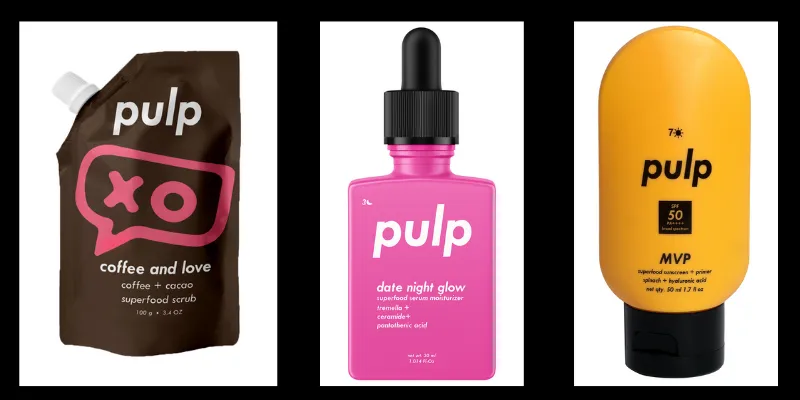Why this D2C superfood skincare brand is targeting Gen Z and millennials
Launched a week before the first nationwide lockdown in 2020, Deepti Alapati and Goutham Uppaluri claim that their D2C startup, Pulp, is the first vegan superfood skincare brand in India.
Deepti Alapati and Goutham Uppaluri had just launched their vegan and superfood skincare brand in the second week of March 2020. The following week, the first nationwide lockdown was imposed in the aftermath of the COVID-19 pandemic, and the brand could not ship any products for the next three weeks.
But while the onset of the pandemic spelt trouble for most businesses, Hyderabad-based Pulp took off with just two face masks.
"We just focused on creating an online buzz and as soon as logistics were solved, we started shipping to our customers. And in the first month itself, we clocked about two to three lakhs with just the masks and zero marketing budget," Deepti tells HerStory.
Within two months, most people knew about Pulp’s two masks, designed in ‘Instagrammable fashion’ with green and pink packaging. She says almost every customer posted about their purchase on social media.
“That was the first milestone that boosted our traction,” she adds.
Tuning the messaging
Fascinated by brands and startups, Goutham returned to India after completing his master’s course in Pharmaceutical Sciences and working for a couple of years in the US.
During every trip to India, his friends and cousins would ask him to get different kinds of skincare products which convinced him of the opportunity in India’s skincare market that was valued at Rs 129.76 billion in 2020.
“I realised there was a lack of brands communicating to these young Gen Z and millennial women in a relatable language.”
Goutham noted that most brands tend to be very clinical and focus on the ingredients whereas Pulp focused its messaging on the customers themselves.
After sending a batch of products for a trial run among his friends and family and getting their insights, Deepti reached out to know more about Pulp and eventually joined as a co-founder.
Today, almost all of its products are tuned towards the Gen Z and millennial lifestyle, and named after specific use cases like 'when you want to go on a date, or 'when you had a long day'.
Priced between Rs 400 and Rs 1,200, the D2C startup has about 11 SKUs with all packaging being done from China.
After making initial investments from their personal savings, Deepti who was earlier associated with T-Hub I reached out to some of the investors she knew from T-Hub.
“I wrote to 50 of them; 10 agreed to talk to me, and two agreed to invest in the first round,” she said, adding that they may raise another round after a year.

(Products by Pulp)
The crowded skincare market
With an ever increasing focus on self-care and wellness in general, skincare and personal grooming products have become popular. Today, the market is filled with brands innovating with different ingredients.
Pulp competes with brands like Skinella, Tribe Concepts, and SkinKraft among others.
The duo says that although there are competitor brands with offerings at relatively cheaper prices, their customers return to them because of "the efficacy of the ingredients used".
If others offer 10 different product lines, Pulp's approach is to “develop one or two that really speak to the customer”. "When we started, we were the first in the country which focus on superfood ingredients,” Deepti adds.
At the same time, Goutham adds that not everybody is a target audience for Pulp.
"We target people whose skincare routine means they just need the problems solved but do not want to go into breakdown of the ingredients. Skincare is not that big a deal to them," he adds.
The entrepreneur duo is focused on building a community as well to ensure a "powerful source of brand advocacy" that builds trust and makes an emotional connection and makes the brand more relatable.
In the next few years, Pulp aims to be the household name when it comes to superfood skincare for youth.
Edited by Teja Lele









